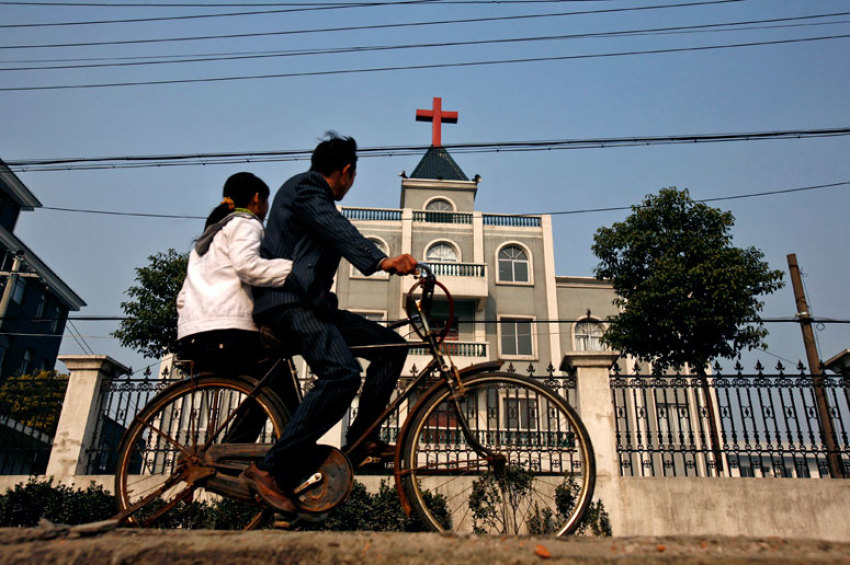1,200 Crosses Taken Down From Churches in China; Christian Leaders Denounce Action as 'Evil'

Chinese Christians recently took to the streets in the southeastern city of Wenzhou – also known as China's Jerusalem and home to China's largest Christian community – to protest against the removal of church crosses in what they describe as "an evil" government campaign where some 1,200 crosses have already been removed from public buildings.
In an open letter in July, Catholic officials described the dismantling of crosses on churches as "an evil act" by the Chinese government that has "caused great resentment and anger among clergy and believers," according to U.K.-based The Guardian. The newspaper also reported that activists say more than 1,200 crosses have been removed from churches in Zhejiang province, where Wenzhou is located. Wenzhou is a city with roughly 1 million Christians among its 8 million residents.
About 20 Catholic leaders staged a rare public demonstration in the city in late July, including 89-year-old Bishop Vincent Zhu Weifang, according to the Catholic news source UCANews.com. Witnesses say Chinese police monitored the two-hour peaceful protest but did not break it up.
The removal of the crosses occurred due to the "Three Rectifications and One Demolition" campaign, imposed by Zhejiang Province's government in March 2013, according to the United States Commission of International Religious Freedom (USCIRF) 2015 Annual Report. USCIRF, an independent, bipartisan U.S. federal commission created by the International Religious Freedom Act of 1998, confirmed that the Chinese government removed and/or demolished at least 400 churches or crosses in 2014 alone. The Commission also reported that most of these aggressions took place in Zhejiang Province and included both underground and state-sanctioned churches.
Pastor "L", who could not be named for security reasons, told Christian persecution watchdog group Open Doors: "With this campaign of total demolition, everyone feels like this is no longer simply about tearing down crosses. It's not merely about symbols — they want to attack your beliefs. Everyone feels like this is the beginning of a deeper repression, where they first do away with your symbols and then attack at a deeper level, destroying your internal organization, your doctrine, your church finances, even your pulpit."
A recent report in the Global Times, a Chinese state-run publication, denied that Christian symbols are being intentionally torched or removed.
However another Chinese church leader, whose name is withheld to protect him from retaliation, told U.K.-based Guardian Newspaper that authorities were attempting to transform Christianity "into a tool that serves the party."
"Each time they take a cross down, we will put more up," another Chinese Christian told the U.K. newspaper. "We are even considering making flags and clothes with cross patterns. We will make the cross flourish throughout China."
Protestant preachers are encouraging their congregations to peacefully oppose the removal of the cross by placing homemade wooden crosses in their homes or on their cars.
The cross removal campaign has sparked international protest with activists urging President Barack Obama to raise the issue with new Chinese President Xi Jinping, when he makes his first state visit to the United States next month.
In China, Christians are divided between government registered churches, which pledge allegiance to the officially atheist Communist Party, and "underground" congregations that maintain their independence from the government.
In 2010, the Pew Research Center estimated there were around 58 million Protestants and 9 million Catholics in China. But experts say in reality there are probably more Christians than there are members of the 87 million-strong Communist Party. Pew estimates that China's Christian population could grow to about 71 million by 2050.
USCIRF 2015 Annual Report summarized: "People of faith continue to face arrests, fines, denials of justice, lengthy prison sentences, and in some cases, the closing or bulldozing of places of worship. Based on the alarming increase in systematic; egregious, and ongoing abuses, USCIRF again recommends China be designated a 'country of particular concern,' ..."
The State Department has designated China as a country of particular concern (CPC) since 1999. When a country is designated as a CPC by the Secretary of State, Congress is notified and may impose economic measure or sanction on that country in the interest of improving that country's religious freedom. The U.S. government can also waive the sanction when there are other national security considerations.



























